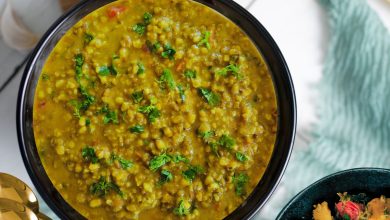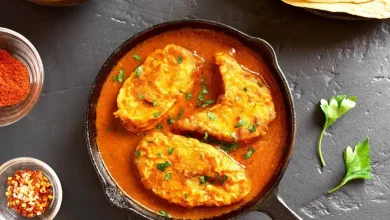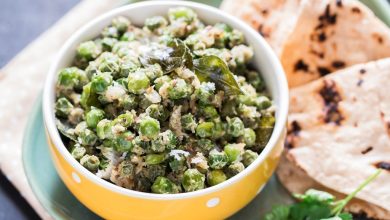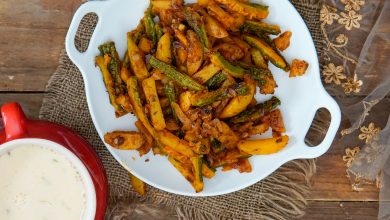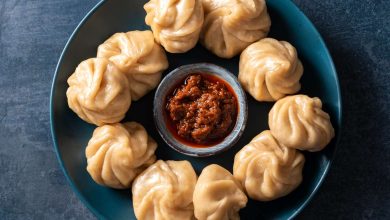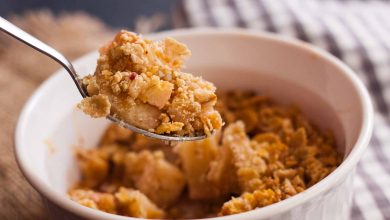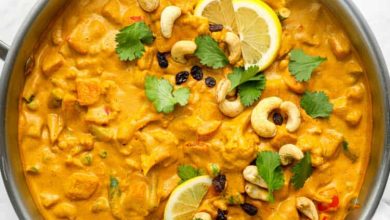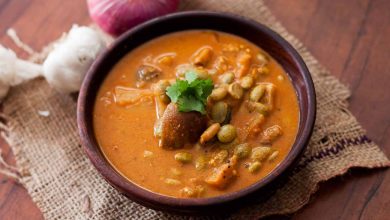Ragi Murungai Keerai Adai: Nutritious Finger Millet & Moringa Savory Flatbread
Ragi Murungai Keerai Adai Recipe: Finger Millet Flour & Drumstick Leaves Savory Flatbread
Ragi Murungai Keerai Adai is a delightful South Indian dish that combines the nutty richness of finger millet (ragi) flour with the vibrant, nutritious flavors of drumstick leaves (moringa). This savory flatbread is not only a hearty breakfast option but also a great choice for anyone looking for a diabetic-friendly meal. With its earthy flavor, this adai is perfect when served with chutneys or even a cup of South Indian filter coffee.
Ingredients
| Ingredient | Quantity |
|---|---|
| Ragi Flour (Finger Millet/Nagli) | 1 cup |
| Drumstick Leaves (Moringa/Murungai Keerai) – chopped | 1 cup |
| Onion – chopped | 1 |
| Green Chilies | 3 |
| Cumin Seeds (Jeera) | 1 teaspoon |
| Sunflower Oil | 1 tablespoon |
| Salt | To taste |
| Lukewarm Water | As needed |
Nutritional Information (per serving)
| Nutrient | Amount per serving (1 adai) |
|---|---|
| Calories | ~120 kcal |
| Protein | ~3g |
| Carbohydrates | ~22g |
| Fiber | ~4g |
| Fat | ~3g |
| Sodium | ~250mg |
| Vitamin A | ~10% of Daily Value |
| Vitamin C | ~15% of Daily Value |
| Calcium | ~5% of Daily Value |
| Iron | ~12% of Daily Value |
Preparation Time
- Prep Time: 20 minutes
- Cook Time: 30 minutes
- Total Time: 50 minutes
Servings
- Servings: 4
Course
- Course: South Indian Breakfast
Cuisine
- Cuisine: South Indian Recipes
Diet
- Diet: Diabetic Friendly
Instructions
1. Prepare the Drumstick Leaves
Start by thoroughly washing the drumstick leaves (moringa) and finely chopping them. Keep them aside. These leaves are packed with nutrients and will give the adai its distinct flavor.
2. Cook the Onion, Green Chilies, and Spices
Place a pan over medium heat and add 1 teaspoon of sunflower oil. Once the oil is hot, add the cumin seeds and allow them to crackle. This enhances the earthy flavor of the cumin. Add the finely chopped onions and green chilies to the pan. Sauté until the onions turn translucent, being careful not to brown them. This step infuses the dish with aromatic flavors.
3. Saute the Drumstick Leaves
Next, add the chopped drumstick leaves to the pan. Saute them on low heat for 5 to 7 minutes until the raw smell of the leaves disappears, and they are well-cooked. This step is crucial, as undercooked drumstick leaves can impart a bitter taste to the final dish. Once the leaves are cooked through, remove the pan from heat and set the mixture aside to cool.
4. Prepare the Dough
In a separate saucepan, bring 2 cups of water to a boil and add a pinch of salt. Now, in a mixing bowl, take 1 cup of ragi flour. Add the cooked drumstick leaves mixture into the flour and mix well. Gradually add the boiling water to the flour mixture while stirring continuously with a wooden spatula to avoid any lumps. Once the mixture is evenly combined, let it cool slightly. Then, knead the dough gently with your hands. The dough should be soft and slightly sticky; if it’s too dry, add a little more lukewarm water to achieve the right consistency. The dough must be moist enough to prevent the adai from breaking while cooking.
5. Shape the Adai
Heat a cast iron skillet or a tawa over medium heat. While it’s heating up, shape the dough into lemon-sized balls. Keep the remaining dough covered with a damp cloth to prevent it from drying out. Place each ball on a banana leaf and flatten it gently with your fingers to form a round, even shape. If you don’t have banana leaves, you can flatten the dough directly on the skillet, but the banana leaf helps retain the moisture and adds a subtle fragrance to the adai.
6. Cook the Adai
Carefully lift the banana leaf with the flattened dough and place it onto the hot skillet. Slowly peel off the leaf from the adai. Let the adai cook on one side until it turns golden and crisp, which should take about 3 to 4 minutes. Flip it gently to cook the other side, and drizzle a little oil on both sides to make it crispy. Cook until both sides are golden brown and crispy.
7. Serve the Adai
Once the adai is cooked to perfection, place it on a serving plate. Serve it hot with a side of carrot-peanut chutney or classic South Indian coconut chutney. A hot cup of filter coffee makes for the perfect accompaniment to this nutritious and filling meal.
Tips for Perfect Ragi Murungai Keerai Adai
- Properly cook the drumstick leaves: As mentioned, ensure that the drumstick leaves are well-cooked. Undercooked leaves can result in a bitter taste that will affect the flavor of your adai.
- Adjust the dough consistency: The dough should be soft but not too sticky. If it feels too dry, add a little more water, but be careful not to make it too wet.
- Use banana leaves for better texture: If available, using banana leaves adds flavor and helps the adai retain moisture while cooking. Alternatively, you can flatten the dough directly on the tawa.
- Cook on low-medium heat: This ensures that the adai cooks thoroughly without burning. The slow cooking allows the ragi flour to cook evenly and results in a crispy texture.
Serving Suggestions
- Chutneys: Pair your Ragi Murungai Keerai Adai with carrot-peanut chutney, coconut chutney, or even a spicy tomato chutney for an added layer of flavor.
- Coffee: To enhance your breakfast experience, serve this dish with a steaming cup of South Indian filter coffee.
Health Benefits
Ragi (finger millet) is an excellent source of dietary fiber, iron, and calcium, making it a fantastic addition to any diabetic-friendly diet. Drumstick leaves (moringa) are rich in antioxidants, vitamins, and minerals, contributing to overall health and wellness. Together, they form a wholesome dish that is both nourishing and satisfying.
This savory flatbread is a great way to start your day with a boost of energy while keeping your blood sugar levels in check. Enjoy the benefits of this traditional South Indian recipe in a modern, health-conscious way!

